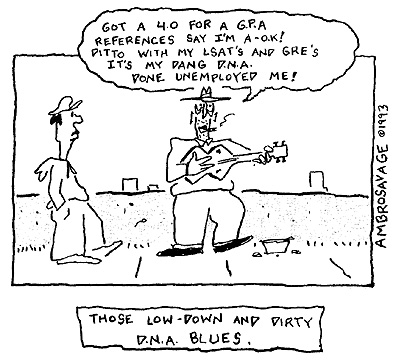


OF AND
RELATING TO
LABOR
A recent survey by the United States Congress' Office of Technology Assessment indicates that already perhaps 10 percent of American companies have used genetic screening. Although most employees are unaware, genetic testing is now possible through blood, urine, or saliva samples.
One problem with genetic testing is that it is unreliable. It can usually tell you if you are a boy or a girl, but a large number of more detailed applications have not been standardized, and evidence exists of poor laboratory practices, according to an article by Paul Billings in the journal Trends in Genetics. Furthermore, the same genetic defect may cause one person to become very ill, but will cause no illness in another person.
Billings describes the case of one family:
A five-year-old family member was severely affected with neurofibromas [a gene-linked illness], which impaired his movement and respiration. His father had never been ill but was identified as a gene carrier after his son's diagnosis. The father could not obtain private personal health or life insurance, which also limited the coverage available to the sick child's healthy siblings.

The odds are that this father might also have a hard time landing a job which includes health coverage. Instead of having a universal health insurance system like most industrialized countries, the US has a system based largely on employment benefits, and a system whose cost is rising faster than double-acting yeast. The result is that US companies are eager to avoid hiring anyone with known gene defects, regardless of whether the person has symptoms or not. If you have a crank gene, you can join what some people are starting to call "the genetic underclass."
Some companies have an additional reason for giving genetic tests to employees. Elaine Draper, author of Risky Business: Genetic Testing and Exclusionary Practices in the Hazardous Workplace, describes how employers use tests to determine which workers will be less sensitive to toxic chemicals in the workplace.
For example, people with certain types of genes may be less sensitive to lead poisoning, radiation, or insecticides. Rather than simply cleaning up the workplace, companies are encouraging a new breed of toxin-resistant humans. A comic-book plot come true.
One reason for the spread of genetic tests is marketing. A host of for-profit biotechnology laboratories have taken up the cause of scrutinizing your double helix. Many companies dealing in DNA and chromosome testing are listed in the yellow pages under such headings as "Laboratories - Biological" and "Laboratories - Medical."
In Washington state, state law prohibits "overgeneral inquiries" of job applicants, and federal law prohibits hiring discrimination on the basis of health disabilities. These protections are so broad, however, that they can only be decided case-by-case in the courts. Besides, most job applicants will have no way to know if a gene test was performed on their urine sample, and no way to prove that the test was the reason for their rejection.
In order to better discourage genetic screening, four states have specifically banned certain types of it for workplace use. Perhaps Washington state could do the same.
If you have concerns about your working conditions, please write to Doug Collins c/o The Washington Free Press, 1463 E Republican, #178, Seattle 98112. Please include your phone number.
Your identity will be kept confidential in any published report, unless you request otherwise.
Thirty years after the Equal Pay Act, the wage gap between women and men has decreased only about 25 percent. Women in unions, however, have fared somewhat better. Male union members make an average of $106 more per week than their non-union female counterparts, whereas female union members average $123 more than non-union female workers, according to data from the Bureau of Labor Statistics.
During the 1980s, many US airlines overextended themselves in capital investments and marketing strategies. The result has been suicidal competition, which has brought the domestic airline industry to a rather low altitude.
Have a Labor-related story to tell? Good news or bad.. send it to Doug Collins WAfreepress@gmail.com and he'll tell the world.
[Home]
[This Issue's Directory]
[WFP Index]
[WFP Back Issues]
[E-Mail WFP]





Contents on this page were published in the October/November, 1993 edition of the Washington Free
Press.
WFP, 1463 E. Republican #178, Seattle, WA -USA, 98112. -- WAfreepress@gmail.com
Copyright © 1993 WFP Collective, Inc.